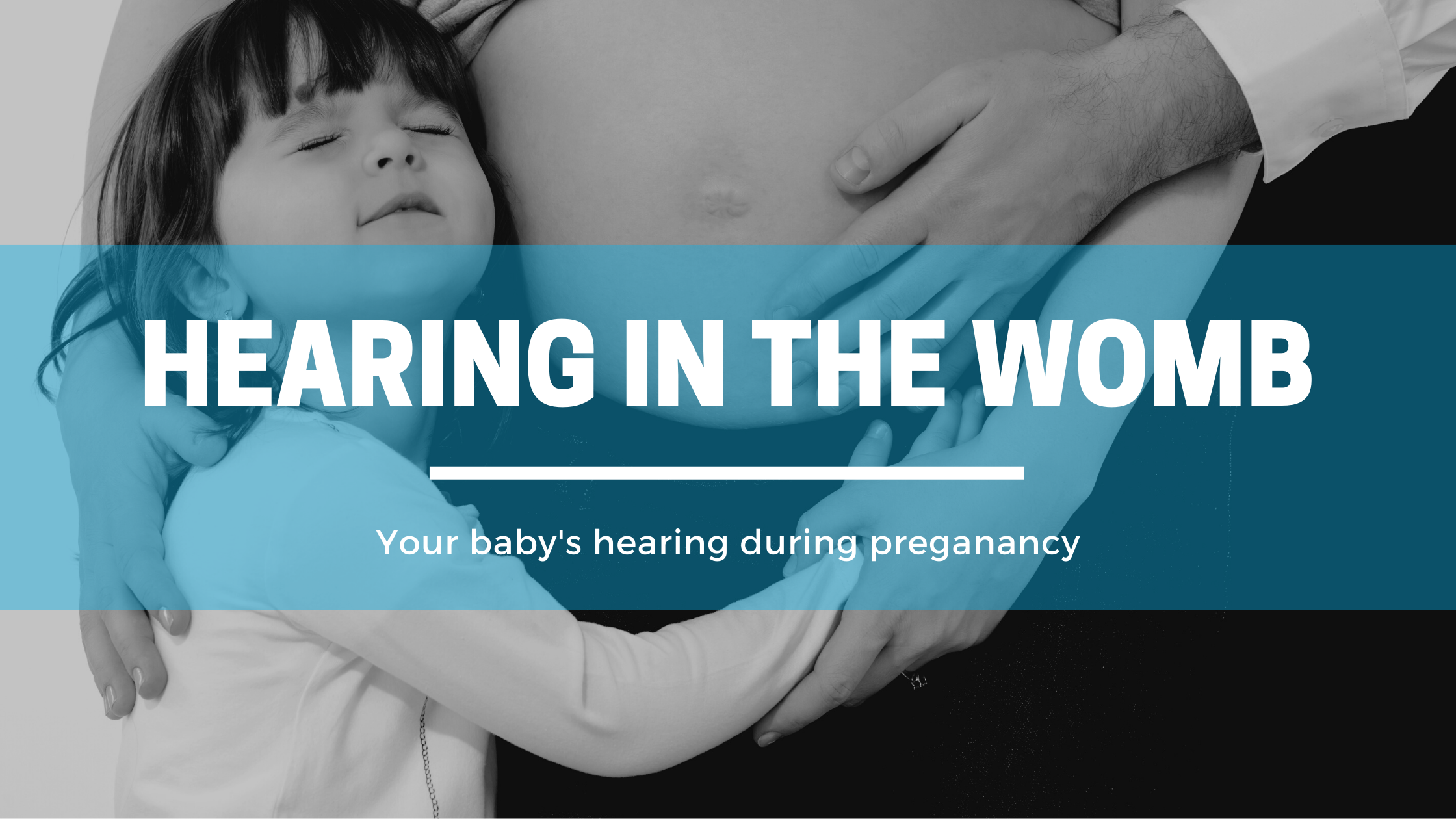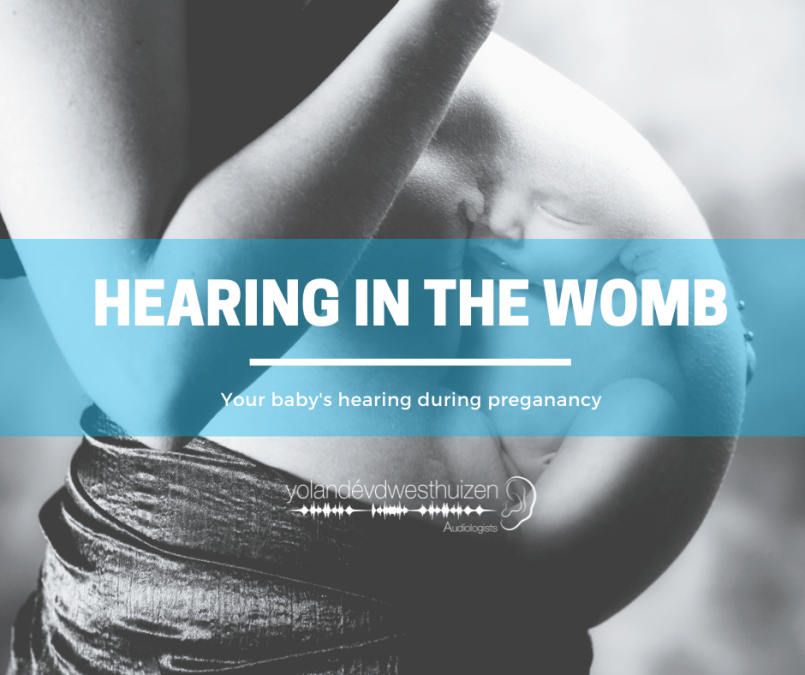
Meet the new addition to our team! Ruth
January 11, 2022
Hearing loss and sexually transmitted diseases
January 27, 2022Your baby can hear you during pregnancy…
 When can your baby start hearing?
When can your baby start hearing?
Between 16 and 22 weeks of pregnancy, your baby may start to hear faint sounds inside your body such as the noise made by your breathing, heartbeat, and digestion. These sounds will grow louder as your baby’s hearing improves.
After 23 weeks, your baby can hear sounds from the outside world, including your voice. At first, your baby’s ears can hear only low-pitched sounds, meaning babies in the womb can generally hear male voices better than female voices. However, your own voice will sound loud to your baby because it’s close and reverberates through your body as you speak. Research shows babies learn to recognize their mother’s voice inside the womb, and show a clear preference for her voice over others.
As your baby’s ears and brain mature, they’ll gradually perceive a wider range of sounds, including more voices in the higher ranges.
At around 26 weeks, your baby may begin to respond to the sounds they hear with changes in their heartbeat, breathing, and movement. If the noise is particularly loud, your baby may startle – and you might feel your baby move. Ultrasounds have also caught changes in babies’ facial expressions when they hear music.
When does the ear structures develop?
Your baby’s ears start developing in the first weeks of pregnancy, and aren’t fully formed until the third trimester. The ear is a remarkably complex organ, with three separate parts (the inner ear, middle ear, and outer ear). Each of these structures develops on its own timetable.
- Inner ear development. By 5 weeks of pregnancy, two small spots appear on either side of your baby’s head – these eventually become the inner ears. Soon they’ll start to fold inward and form sacs just beneath the surface of your baby’s skin. The sacs then lengthen into a tube, and the main organ of hearing (cochlea) takes shape at the end.
- Middle ear development. Around 8 weeks of pregnancy, the ear bones – tiny structures that vibrate and help process sounds – begin as small clumps of tissue that slowly harden over the coming weeks. A tube-like cavity that will become the middle ear begins to form around these structures.
- Ear-brain connection. Around 12 weeks of pregnancy, specialized sound transmitters called hair cells spring up inside the cochlea and eventually connect to a nerve that sends sound impulses to the brain. This connection is made at about 16 weeks, when your baby may start to hear faint sounds.
- Ears fully formed. By 32 to 35 weeks of pregnancy, the middle ear cavity, outer ear canal, and outside part of the ear are fully formed. Your baby is ready to listen and respond to the sounds they’ll hear as soon as they’re born.
How well can my baby hear in the womb?
The noises and voices your baby hears from the outside world sound muffled. That’s because they have to pass through multiple layers, including your skin and the wall of your uterus as well as the amniotic fluid. Plus, it’s noisy inside your uterus – sounds from your breathing, heartbeat, and digestion are as loud to your baby as a washing machine.
That said, your baby will hear your voice more clearly than all others. That’s because the sound of your voice reverberates through your body when you speak. Research suggests babies in the womb may become more alert when they hear their mom talking or reading aloud.
Sounds your baby hears in the womb contribute to hearing and brain development, which will continue once your baby is born. You and your partner don’t need to do anything special to facilitate this.
How to protect my baby’s hearing in the womb?
 You can take steps to protect your baby’s hearing such as:
You can take steps to protect your baby’s hearing such as:
- Be careful with medications. Taking certain drugs during pregnancy, including some antibiotics, has been linked to hearing loss in babies. Tell all your health care providers (even your dentist) that you’re pregnant, and talk to your doctor or midwife to make sure you’re taking safe medications for pregnancy.
- Avoid prolonged, very loud noise. There’s some evidence that long-term exposure to very loud noise – like 8 hours a day, every day – can damage your baby’s hearing. Some experts recommend avoiding any routine noise louder than 115 decibels (about as loud as a chainsaw) while pregnant. It’s best to avoid any noises louder than that, such as a rock concert or shooting range, as much as possible. That’s true even if you’re wearing hearing protection, because the noise can still travel through your body to your baby’s ears. If you work in a very loud environment (say with noisy machinery or at loud events) you may want to ask your employer if you can work in a quieter location for the duration of your pregnancy.
- Eat fish that’s low in mercury. Fish is full of healthy omega-3 fatty acids that help your baby’s brain grow and develop, but some kinds also contain high levels of mercury – which has been linked to certain birth defects, including hearing loss. To balance these risks and benefits, the U.S. Food and Drug Administration advises pregnant women to eat 8 to 12 ounces a week of low-mercury fish. Eat a variety of safe fish (such as salmon, cod, shrimp, and tilapia), and avoid the four types of fish that have the highest amounts of mercury: swordfish, tilefish, shark, and king mackerel.
- Don’t drink alcohol. Drinking during pregnancy can cause a group of birth defects known as fetal alcohol spectrum disorders (FASDs). Children with an FASD can have hearing loss and trouble with speech. No one knows how much alcohol it takes to cause the condition, so it’s best to be on the safe side and avoid alcohol altogether.
- Play music. There’s no evidence to support the myth that playing Mozart or other music for your baby in utero will make them smarter. However, evidence suggests listening to music (as well as people talking and other sounds from the environment) can help develop your baby’s hearing, memory, and emotions. To protect your baby’s delicate ears, make sure the music isn’t too loud. Never place ear or head phones directly on your belly, as the sound will amplify to dangerous levels as it travels to your baby.
(Reference: Babycentre.com)
Contact us if you are concerned about your baby’s hearing!
centurion@yvdwaudiology.co.za | benoni@yvdwaudiology.co.za | saxby@yvdwaudiology.co.za
Have you had your hearing checked? Do our online screening right here!!




2 Comments
My baby girl hv problem in her ear what can be the problem
God day Musawenkosi.
There are so many thing that can be wrong in the ear – it really would be best if you tale her to a Doctor or Audiologist to look at the problem!